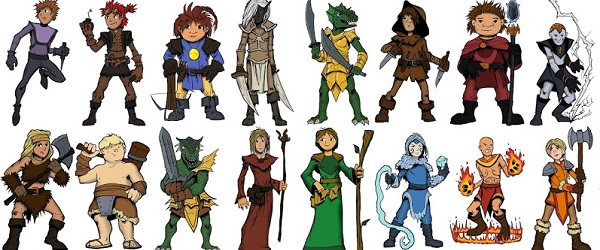I’m not exactly proud of this, but I think it’s time I finally copped to it: I got my six-year-old addicted to video games.
Ironically enough, I was six myself when I got my first real taste of electronic entertainment. The original King’s Quest made my Apple IIe’s floppy drive shudder as though suffering from Saint Vitus’ dance, but I still loved losing myself in a fantastic world filled with wonder and danger at every turn. Perhaps that’s why I didn’t think much about downloading a game for my phone called Wayward Souls, a title so challenging that The Wall Street Journal dubbed its ilk “masocore” gaming. I also didn’t mind when my six-year-old saw the icon and asked if he could play it. Surely a kid wouldn’t find an intentionally frustrating game interesting, right? Wrong, wrong, wrong. The fantastic setting, the sword-swinging action, the mysterious monsters—he loved it all, and soon it became all he could talk about.
That got me worried.
You don’t need a medical education to find the data about children’s screen time sobering. Some studies assert than children spend approximately three hours each and every day in front of screens, and that number jumps to nearly seven hours once they reach their teens. The American Academy of Pediatrics has linked screen time to obesity, and a few scholars argue that overexposure can have a negative cognitive impact. Even if such claims tip toward hyperbole (and I suspect that they might), it makes sense to limit your little ones’ exposure. On the other hand, my six-year-old hasn’t shown much interest in fantasy until now. Attempts to introduce Lewis and Tolkien mostly fell flat. What a creative, genre-loving father to do?
Here was my solution: I broke out pen, paper, and dice, and we made our own adventures.
Okay, so we kinda made our own adventures. We had a lot of help from Hero Kids, a pen-and-paper roleplaying game by Justin Halliday. Designed for children ages four to 10, it offers all of the delightful escapism of a video game with none of the screen-related downsides. What’s more, it’s surprisingly easy to get into if you’re an RPG neophyte (which I was). You learn a few simple rules. You print some maps and cut out character figures, which the kiddos can color if they’re so inclined. You, the parent, read through a general scenario. And then you embellish it, leading up to four tiny heroes on a quest, spawning monsters and malefactors for them to vanquish as they traipse through an imaginative subcreation.
By this point, I’m sure some of you are looking askance at this piece. If you were a Christian child in the eighties, you probably heard plenty of dire warnings about Dungeons & Dragons, and Hero Kids resembles that infamous ruleset more than a little. Also, some parents don’t want to expose impressionable minds to high-fantasy tropes, and in the main player’s guide, Halliday himself notes, “Role-playing games often take place in ancient worlds with polytheistic or pagan religions. This may be a sensitive area for the parents of some kids.” True enough. I don’t want to discount anyone’s concerns. But Hero Kids is what you make it. The gamemaster—which is you, the parent—has total control over the proceedings and can spin grand or cozy adventures from the scenarios provided. When a character intones, “Praise the gods,” it isn’t particular difficult to redact that reference to a singular deity. Also, Halliday recommends dialing down all violent content by describing vanquished enemies as knocked out or scampering away at the end of a fight.
For our family, Hero Kids has become a way to enjoy genre particulars away from the ever-present black mirror. My six-year-old, four-year-old, and myself have so far saved a tavern muckboy from rodents of unusual size; fought off giant, intelligent spiders who took over an abandoned mine; and survived a kidnapping by pirates who were more—or perhaps less—than they initially appeared. My oldest still asks to play Wayward Souls sometimes, and sometimes I let him. But it’s no longer the only way for him to enjoy the fantastic.
(Picture: Copyright 2016 by Justin Halliday; used under fair use)
- “Hatchet” Is the Best Sort of Mature Book - August 11, 2021
- Imagination, Instruction, and a Cheery “Robot” Quartet - February 3, 2021
- A Contentious, Incontestible Boy - January 27, 2021

Leave a Reply